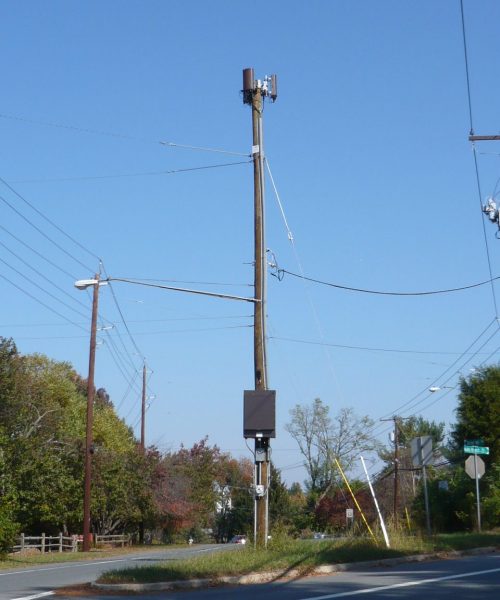The Washington Post, “The Switch”
By Brian Fung and Katherine Shaver, October 25, 2018
More than a dozen U.S. cities are challenging federal regulators in court over a recent decision that could give telecom companies millions in financial and other breaks as they race to build a next-generation wireless network powered by 5G mobile data.
On Wednesday, officials from Los Angeles; Portland, Ore.; and Bellevue, Wash., among others, asked the U.S. Court of Appeals for the Ninth Circuit to review the rule change by the Federal Communications Commission, which restricts cities’ ability to charge for access to public utility poles.
Under the FCC’s new policy, telecom carriers seeking permits to install their network equipment on public infrastructure must have their requests reviewed more quickly by city officials. Cities are also required to charge carriers no more than $270 per year per cell site in access fees. Before the new policy, carriers could expect to pay $500 per pole annually, on average, according to an agency study.
The changes were mandated by the FCC as part of an effort to accelerate the spread of highspeed wireless infrastructure. Supporters say the technology — a successor to the 4G LTE available on many smartphones — can deliver download speeds faster than what many Americans receive on their home Internet connections. It is also expected to help usher in new products and services, such as self-driving cars and telemedicine. The FCC did not immediately respond to a request for comment.
A slew of cities opposed the FCC rule change before it was approved by all four FCC commissioners in a vote last month. Some city officials argued that the reduced fees could undercut public programs. By approving the measure, the FCC would be “severely hindering local governments’ ability to fulfill our public health and safety responsibilities during the construction and modification” of cell sites, wrote Brent Fedors, county administrator for Gloucester County, Va., in a letter to the agency ahead of the vote.
Others, such as the city of San Jose, said the FCC decision interferes with local officials’ autonomy to strike their own construction agreements with telecom carriers. In June, San Jose settled on a $500 million deal with AT&T and Verizon to build out a local network. The city is among those appealing the new FCC policy.
A handful of local governments around the nation’s capital are also planning to oppose the FCC in court. Montgomery County, which is considering changing its zoning regulations governing where cell towers may go, plans to join other local governments in the D.C. region in filing a separate appeal of the FCC order in the U.S. Court of Appeals for the D.C. Circuit. That appeal has not been filed yet.
“We plan to argue that the FCC has significantly overreached and is seeking to remove local control,” said Montgomery County Council President Hans Riemer (D-At Large).
The county now requires that cell towers be at least 300 feet from residential areas. However, the Montgomery council plans to vote Tuesday on a proposal to allow small-cell antennas and other equipment to be located closer to homes. Riemer said the county needs to respond to wireless companies that say small-cell equipment must be clustered closer together, mostly on utility poles and streetlights. They say that will provide better coverage than the traditionally much larger cell towers that the county’s 1990s-era zoning regulations were aimed at. The exact
distance hasn’t been determined yet, but council members have proposed new setbacks ranging from 30 feet to 60 feet.
The county council also is considering when companies’ applications for small-cell facilities would have to go through a public hearing process, which takes more time and costs thousands of dollars. Riemer said he hopes the council can agree on new county regulations before the FCC order takes effect in January. “I think it would help make the case that local governments can be relied upon to make changes for wireless technology,” Riemer said.
The D.C. Council recently began considering legislation that would govern where small-cell towers could be located in the city.


